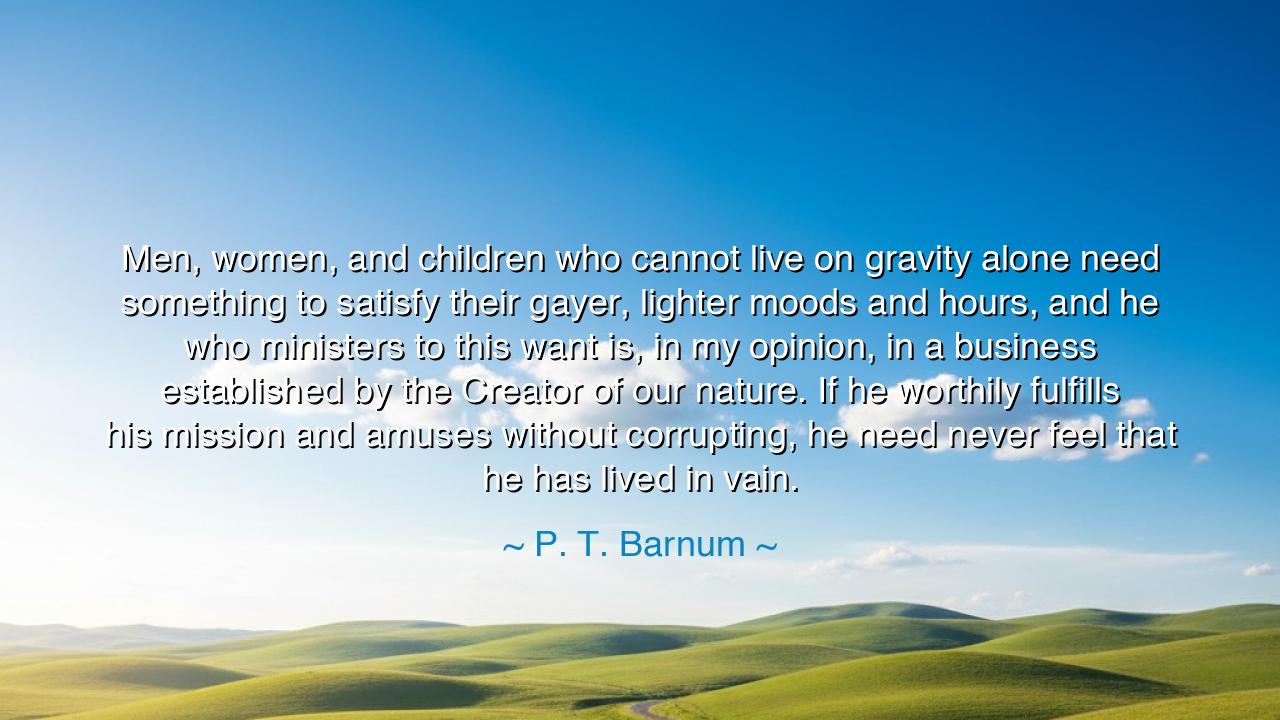
Men, women, and children who cannot live on gravity alone need
Men, women, and children who cannot live on gravity alone need something to satisfy their gayer, lighter moods and hours, and he who ministers to this want is, in my opinion, in a business established by the Creator of our nature. If he worthily fulfills his mission and amuses without corrupting, he need never feel that he has lived in vain.






“Men, women, and children who cannot live on gravity alone need something to satisfy their gayer, lighter moods and hours, and he who ministers to this want is, in my opinion, in a business established by the Creator of our nature. If he worthily fulfills his mission and amuses without corrupting, he need never feel that he has lived in vain.” — P. T. Barnum
In these words of P. T. Barnum, the great showman and visionary of entertainment, there lies a wisdom deeper than mere jest or spectacle. Barnum, often remembered for his circuses and curiosities, here speaks as a philosopher of joy. He declares that amusement, rightly given, is not a frivolous thing but a divine calling — that humanity, made not only of flesh and intellect but also of spirit, hungers for lightness and laughter. “Men, women, and children,” he says, “cannot live on gravity alone.” Just as the body requires bread and the soul requires faith, the heart requires gladness. To bring laughter without shame, to awaken wonder without deceit — this, Barnum insists, is a work ordained by the Creator of our nature.
The origin of this thought reflects Barnum’s own life. Born in 1810 in humble Connecticut, he rose from poverty to become one of the most famous entertainers of the nineteenth century. But his genius was not merely in business; it was in understanding the human spirit. In an age still marked by stern morality and industrial toil, Barnum saw that people longed to be astonished — to escape the dull weight of routine and glimpse the extraordinary. Through his circus, his museum, and his traveling exhibitions, he offered this escape, not as deception but as a celebration of imagination. To Barnum, to amuse without corrupting was a sacred duty — for laughter, when pure, is a kind of prayer of joy.
This belief is ancient. The philosophers of old understood that joy and play are not the enemies of wisdom, but its companions. Aristotle wrote that leisure and delight were essential to a balanced life; even King Solomon, in his wisdom, said there is “a time to laugh.” Barnum, though a man of the modern world, echoed these eternal truths. He knew that the Creator did not design man to dwell forever in solemnity. The same divine spark that drives invention and virtue also kindles the desire for wonder, for stories, for music, for spectacle. The world’s beauty is not only in its laws and order, but in its mystery and mirth.
Consider the example of Charlie Chaplin, who came many decades after Barnum but embodied his philosophy. Chaplin’s films, though filled with laughter, spoke also of tenderness and hope. He made the weary smile and the broken believe again. Like Barnum, he “amused without corrupting,” and thus his art became not trivial, but timeless. When the poor in spirit laughed at his antics, they found in that laughter a glimpse of their own dignity and endurance. Such entertainers, Barnum would say, are ministers of joy, servants in the great temple of humanity’s need for light.
Barnum also offers a warning wrapped within his praise. To amuse without corrupting is no easy task. The power to delight is also the power to degrade. Entertainment, when twisted by greed or cruelty, can make the soul smaller instead of larger. He who entertains must, therefore, be guided by conscience — to uplift rather than mock, to inspire rather than exploit. Barnum himself faced criticism for his exhibitions, yet he sought always to frame them within wonder, not vice. He believed that the true purpose of amusement was not to deceive, but to awaken curiosity, to make the audience feel alive and connected to the world’s strangeness and beauty.
The lesson, then, is radiant and enduring: joy is holy, and those who bring it to others are doing divine work. Whether you are an artist, a teacher, a parent, or simply a soul among souls, you too can “minister to this want.” Bring laughter to the sorrowful, music to the weary, gentleness to those hardened by life’s weight. Let your presence be a rest for others, your words a spark of light in their darker hours. As Barnum teaches, no one who brings honest joy has lived in vain.
So, O child of earth, remember this: to live well is not only to labor and to pray, but also to delight and to give delight. When your laughter is kind and your humor pure, when your creativity lifts others instead of belittling them, you serve the same divine purpose Barnum saw in the circus tent — to remind the world that beneath its struggles and solemnities, life is a festival of wonder, and joy itself is one of the Creator’s highest gifts.






AAdministratorAdministrator
Welcome, honored guests. Please leave a comment, we will respond soon